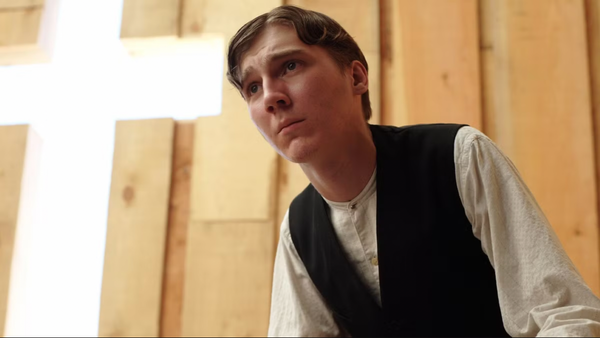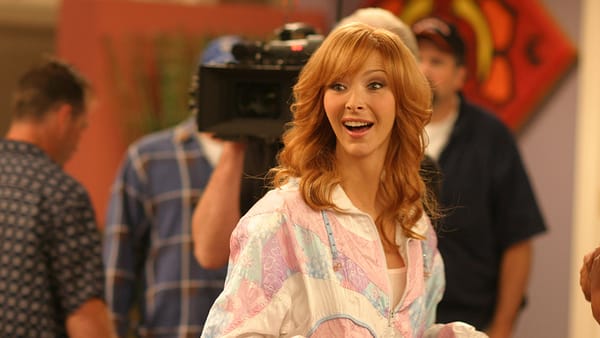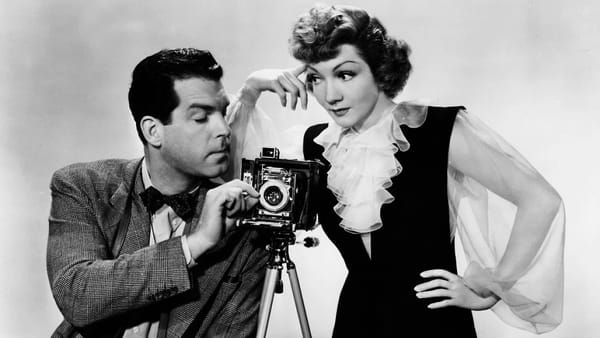Good Boys

Channing Tatum and His Magic Mikes, Keanu Reeves, Johnny Knoxville, Simon Rex, and the Himbo Ascendent
Dog, starring Channing Tatum as an ex–Army Ranger with PTSD who bonds with his unit’s Multi-Purpose Canine en route to his buddy’s funeral, is a road-movie two-hander in which one character is loyal, energetic, impulsive, excitable, quick to anger and eager to be loved — and the other is a Belgian Malinois.
Dog is troopaganda, sentimental about the bonds among veterans and sombre about our Fallen Heroes; Tatum’s Jackson Briggs (named for the Mortal Kombat character?) sings old Ranger drinking songs with his littermates, still in denial about the lingering trauma of the brain injury that earned him his discharge. Tatum lounges on the hood of his truck staring off into the middle distance like a Hallmark-movie heartland heartthrob, but gets shot down by condescending hipster chicks. His natural Alabama drawl, slurred and semi-sarcastic, suggests, as always, a sly boy brought up with good manners. He wants to play — but the film’s story beats repeatedly undercut his confidence, putting him in awkward situations and silly outfits. Dog is not faith-based entertainment, one of the few routes to box-office success left outside the realm of IP blockbusters, but nor is it impossible to imagine church groups blocking out a whole theatre on a weeknight. At the same time, its unironic and unsophisticated values also point to its wider appeal. The scenes of Channing Tatum begging a military contractor to sign off on his clean bill of mental health so he can resume a purpose-driven life share a sense of high-spirited pliability with the scenes of Channing Tatum maintaining a running monologue with a dog who pushes his intellect and self-knowledge to its limits. How to Understand the Moods of Your Channing Tatum: The corners of his mouth prick up when he’s happy, and his puffy features go pouty when he’s hurt. To calm the dog he pops in a DVD of Grey’s Anatomy that they used to watch together in Afghanistan, and the two sit side-by-side in front of the television, a couple of whining cuddle-pups promising companionship and obedience to whoever rescues them.
Men — aren’t they adorable? In the first Magic Mike, released in the wake of the Great Recession, Tatum and the other cock-rocking kings of Tampa are independent contractors selling their bodies for a pittance, and are willing to betray each other over a few fistfuls of singles. That wasn’t why the movie was a hit, though, and Magic Mike XXL duly became a feel-good musical about bros hugging out their differences, encouraging each other to follow their dreams, and caravanning across the South performing worshipful, uplifting routines for “goddesses.”
The Magic Mike brand now encompasses a live revue — currently performing in Las Vegas, London and on tour — and a competition reality show on HBOMax (hosted by Adam Rodriguez, from the movies; Channing Tatum, who does not appear, is an executive producer). On Finding Magic Mike, men who have “lost their magic” compete for a spot in the Magic Mike Live cast and a cash prize. The main challenge of each episode is designed to draw out some ineffable quality — “attractiveness,” “charisma,” “connection.” The Mikes (that’s what they’re called, “the Mikes”) are coached to be confident but not cocky, attractive but not vain, sexy but not aggressive. (It mostly seems to come down to having dimples and maintaining eye contact.) One of the Mikes, with some of that Mama Tried hellraiser charm and tight cutoffs to accentuate his package, whose favoured move when giving a lap dance is to tie up a woman’s hands with his belt, is repeatedly lectured about making sure the dance is about the woman, not about him, before he gets kicked off the show for violating COVID protocols.
The rest are more compliant; in between dry-humping busloads of squealing tourists and rehearsing grueling choreography, they get reality-show character arcs about overcoming gender expectations, childhood trauma, sexual hang-ups and body-image issues. (You’ll still be able to guess the winner the first time you see the whole cast shirtless). They become a band of brothers, different races united by the same vulnerabilities, and find new purpose in life after stalling out in careers in athletics or the military. If that purpose is ultimately just to give pleasure to women, then so be it. Their journey is the same as that of Joe Manganiello’s washout entrepreneur from Magic Mike XXL, who regains his sense of self by making a woman smile when he shakes his tight little buns to a poptimistic bygone Backstreet Boys hit. It’s enough just to be beautiful, charming and cheesy. Later in XXL, Manganiello’s character flirts by proclaiming, to a rich divorcée, that he shaves his pubic hair at least once every three days; by the end of the film he is excitedly embracing his destiny as a future trophy husband.
Now is the moment for the himbo. “Himbos are like service dogs,” an editor for The Cut gushed on a recent episode of a podcast dedicated to the phenomenon. The himbo is beautiful, dumb, and above all sweet, supportive. Magic Mike XXL — a key text in the Himbo Literature — is a film explicitly about looking at men; the camera adores them, so do we, and because we’re the ones doing the looking, we are able to define the terms of the encounter. Thus the Backstreet Boys dance is a tribute offered up with humility and humour, not the harassment of a woman in a service job just trying to make it through her day with a minimum of fuss; this vision persists into a film like Dog, in which even Tatum’s moments of pigheadedness seem to us to be transparent, and therefore, plausibly, lovable. These hot men with vacant heads are empty vessels (propped up by a discourse ecosystem of which New York Magazine verticals like The Cut and Vulture are an enormous part). As Instagram pushes public-facing people to conform to unrealistic body-image expectations, and as evolving standards of behaviour have reframed some alpha-dogging traits as toxic, we’ve harvested a lush crop of men onto whom to project our expectations of unproblematic masculinity.
The term “himbo” was coined in the late 80s by the Washington Post film critic Rita Kempley, as a term of derision for the hardbody action stars of the day — your Arnolds, your Slys. “When freshly oiled,” Kempley wrote, “they gleam like chromed engines. They’re not men, they’re machines,” and they seemed, in their steroidal preening amid high-ordnance Cold War blockbusters, to embody the militarism and materialism of the Reagan 80s. Exercise, in the postwar decades a newly commercialised mainstream activity, was associated with narcissism, not yet with wellness or dutiful self-optimisation.
In recent times, the old suspicion of male beauty has relaxed, and modern pop-cultural history been revisited, in a sort of masc version of those tabloid-revisionist 90s period pieces like I, Tonya or Pam and Tommy. Obliviousness is now coded as blissful ignorance, and a moral ideal. Take, as The Cut podcast does, Keanu Reeves, one of those “sensitive hot guys, whom critics assumed had no thoughts, just vibes.” This self-proclaimed dumb guy has latterly become something of a secular saint, known for viral moments of wisdom and kindness — while “I know kung fu” was once a laugh line at the expense of his supposed dimness, Keanu’s unchanged dopey voice and lack of pretension now mean he’s mistaken for an actual Zen master by a breathless meme-industrial complex.
It’s a revealing little quirk of history that so many of the smart, edgy young actors from the 80s and 90s are stupid and embarrassing now, while the dumb pretty ones are wise, and still pretty.1 Brad Pitt’s boy-toy passivity has firmed up into a kind of stoicism, and his malleability matured into openness to diverse perspectives (his first Oscar was for producing 12 Years a Slave). Meanwhile, Johnny Depp, who made such counterintuitive choices when bringing wounded outsiders to life in all their dangerous innocence, who played guitar and rolled his own cigarettes, is now a Madame Tussaud’s statue addicted to snorting Hunter S. Thompson’s ashes. Sean Penn, once the tormented soul of raw young manhood, these days has a face the colour of pomegranates, a string of farty, self-mythologising bombs to his name as a director, and a checkered history of flailing, grandstanding would-be humanitarian interventions. Robert Downey Jr., the live-wire pansexual jitterbug who could always charm his way into another chance, is the hollow-eyed void at the core of the Marvel Cinematic Universe.2 So much for your tortured artists. What we have instead are caricatures of the kind of grotesque licence that was, until a few years ago, an accepted byproduct of the challenging and inspiring work done by men of real genius.
Possibly the sun these guys flew too near to was an attitude of defiance towards Hollywood’s phoniness, a posture which is now obsolete — the old Gen X prohibition against Selling Out is unenforceable now that every person is necessarily a brand — and furthermore seems the exclusive preserve of egomaniacal pseuds. Burned as we have been by difficult men, we no longer expect them to be our artistic and intellectual leaders. We would much rather they simply smoke a bowl and chill out on the couch, like Robert De Niro does in Jackie Brown, until he doesn’t. His ass used to be beautiful. Verily, the bar has never been lower.
I remember when these guys were the enemy. Jackass Forever hit theatres this winter on a wave of good press and good vibes; the beatifically concussed Johnny Knoxville, with silver-foxy white hair and a t-shirt that says “Daddy,” is the ringleader of a crew whose every wipeout and nut shot is taken as a display of positive masculinity and inclusive male friendship. If the Jackass boys are not exactly pin-ups, they’re still meatsacks offered up for our deliction, promising timeless visceral responses at the exclusion of any more complicated engagement. This promise is made explicit in the new film’s “Dum Dum Game” stunt, in which they get hit in the balls whenever they fail to answer fourth-grade maths questions. The jackasses not on duty for any given stunt stand around during it and laugh, hooting and hollering in incredulity and admiration; that many of the stunts have always have a homoerotic tinge — Steve-O grabbing the backs of his thighs and putting his legs up to shoot a bottle rocket out of his asshole, or Chris Pontius drinking animal jizz — seems further evidence of the show’s untroubled embrace of pure physical pleasure and corporeal acceptance, its “macho drag” that isn’t insecure or standoffish.
This is quite the face turn. The moral panic around Jackass in its early days on MTV wasn’t just a matter of sanctimonious senators looking for a news cycle to comandeer, or highbrow critics missing the point: even some teenagers recognised in Jackass the kind of homosocial banter that’s easily elided into homophobic bullying, that language of cup-checks and grabbass and unprovoked physical assaults by which boys enforce social pecking orders of the kind that also existed on the Jackass set. (Knoxville is the emcee-impresario who conceived the show with director Jeff Tremaine and executive producer Spike Jonze, and the cast of skate kids from various crews was assembled to surround him; certainly no one would ever pick on Knoxville’s phobias as he elaborately and repeatedly triggers Bam Margera’s fear of snakes.) The moments when cliques and hierarchies become evident in the four Jackass films are more frequent than contemporary admirers care to acknowledge. The new film emphasises team spirit and mutual respect by having the ageing original cast members pass the torch to new performers, a racially mixed crop of surrogate sons who grew up watching the show, and one surrogate daughter. Yet even in Jackass Forever there are moments when the butt of a joke snaps in a moment of pain or fear, and real anger surfaces for a moment before he can play it off with a “Not cool, guys!”, and eventually laugh about how good they got him. You can’t be a pussy about it, otherwise they’ll just keep picking on you. (Danger Ehren in particular has described being bullied over the course of the franchise.)
Jackass has certainly gotten better at channeling its wanton destructiveness inward — there’s been far less fucking with the general public since the sequences in the first film, in which they disrupted unsuspecting Japanese commuters to a soundtrack of “Oriental” music. I guess this is growing up, though the Jackass Forever lovefest says more about how we’ve changed than how they have. Jackass, which professionalised the animal impulse of young men to do stupid shit, is part of a lineage of art which demonstrates how the animating force in much of America is boredom; skateboarding and hardcore punk are natural bedfellows, and Jackass, which has its roots in amateur skate videos, is cousin to a song like Big Black’s confrontational “Kerosene,” which, as bassist Dave Riley explains in Our Band Could Be Your Life, is about the kind of bullshit no-place where one of the only things to do is “Go blow up a whole load of stuff for fun.”3 The lack of a belief in a future, the quest for stimulation, and the youthful feeling of immortality combine in Jackass in ways that are potent and, in retrospect, progressively more poignant. This is true of even something as simple as the recurring bit in the first film in which they sneakily shave off chunks of each other’s hair with a set of electric clippers. It’ll grow back, right?
The fact that some of the same people who might have once found Jackass threatening now find the same bits sweet speaks to the shifting understanding of American masculinity during the Himbo ascendancy. If I were to complain that Bam Margera is punching down when he runs around the set clocking people for his howling admirers like a schoolyard bully, then I’d be punching down, too. All those once-beautiful limber skate-kid torsos have gotten paunchy, and scarred from years of electrocuting each others’ nipples, shooting each other out of cannons and crashing skateboards, mountain bikes and shopping carts; they’re hobbled by self-inflicted injuries from stunts and by the offscreen excesses that have often accompanied the show. Preston Lacey is 51 years old, he sighs in the film after failing to control his bowels; Steve-O has dentures, wears spectacles, and speaks openly of his hard-won sobriety and one-time death wish. Jackass, a film cycle about white men experiencing immense physical pain, was made over the first two decades of the 21st century against the backdrop of the opioid crisis, and has not been untouched by what sociologists call Deaths of Despair. Ryan Dunn killed himself and his passenger driving drunk; Bam, once a cute, smirking longhaired tearaway who could practically fly, was fired from Jackass Forever because his severe alcoholism makes him a danger to himself and others.4 (To acknowledge another prolific killer of American men: in Dog, Tatum’s old war buddy died in a single-car crash, an apparent suicide and homefront casualty of war.) That some of the Jackass boys come from money doesn’t significantly change the metaphor, especially not given the realities of downward social mobility. They are the white male victims of late capitalism whose disposable bodies, like those of the Mikes, might also be their tickets out of nowhere. To the extent that Jackass has a story, it’s of one unlikely escape from death’s clutches after another. That the new movie initiates diverse, fresh-faced new jackasses is not just a utopian vision of detoxified camaraderie but a victory against time, one last act of defiance; all the homoerotic undercurrents are men celebrating the bodies society wants to bleed dry. Our admiration for them, as for all himbos, is surely tinged with at least a little pity. Bless their hearts.
Another fin de siècle MTV personality with a beautiful body and an empty head returned to screens in recent months, similarly laden down with the baggage of past-expiry pop culture. Simon Rex rides into Red Rocket to the strains of “Bye Bye Bye” — by *NSYNC, not the Backstreet Boys, though obviously from the same Orlando factory, with the same cheery teen-idol smiles and prefab choreography that Joe Manganiello eagerly imitates when objectifying himself in Magic Mike XXL.
The *NSYNC song and Rex’s face immediately conjure pungent associations from a shallow time: of MTV, where Rex was a VJ; of Paris Hilton, whom he dated, and the rise of celebrity-driven reality television; of Girls Gone Wild, via Rex’s early experience as a boy gone wild on a couple of porn tapes. He’s yesterday’s news — a thousand kids just like him get off the bus in Los Angeles every day, as the saying goes, and as Red Rocket opens, his washed-up character Mikey Saber is on a bus that’s pulling back into his old hometown. He sold his body for years, made a pretty good living at it for a while, but no one is buying anymore.
In his guise as “Dirt Nasty,” of the cursèd novelty-rap group Three Loco, Simon Rex spat lyrics about receiving oral sex from a girl who is “barely legal/hotter than a jalapeño,” and Mikey Saber follows through in Red Rocket, grooming a local 17-year-old for a career in porn, making her his ticket back to the big time. Like the first Magic Mike, Red Rocket has something to say about sex work, exploitation, and Hobbesian American capitalism — but the press coverage of the film mostly focused on how these days Simon Rex lives in the desert in a state of gratitude, like a monk. He understood the “ridiculous, macho” Mikey Saber well enough from his Dirt Nasty days, he told Vulture, but these days he’s just “trying to remain humble,” and, as multiple interviewers have reported, writing down the names of movies he’s never heard of, to look up later. He’s as much an Adonis today as he was two or three decades ago, before the fame machine ground him up, but stripped of the toxic big-swinging-dick swagger he brings to Mikey. Of that distance, and of his performance, he says: “I don’t know if I could have gone to those depths before I got slapped down.”
Is what we want from these men that they feel chastened? All the stan tweets and laudatory publicity — do these expressions of love not also serve, like doggie treats, like belly rubs, to reinforce a relationship of dominance? Tell me, Rex: Who’s a good boy?
Footnotes:
- With the notable, happy exception of slacker dilettante-novelist fuckboi turned hobo-chic sage Ethan Hawke. And Nicolas Cage is, to understate the case considerably, sui generis.
back - Or compare the rising and falling fortunes of Matt Damon and Ben Affleck. Damon once chased after auteur collaborators while the paparazzi chased Affleck to and from Dunkin Donuts; now Damon shills for crypto and Affleck keeps falling upwards into the arms of progressively sexier women. It’s the classic Dumb Smart Guy/Smart Dumb Guy dialectic, which makes sense as both Damon and Affleck are, ultimately, from Massachusetts.
back - On the class politics of Jackass, of its engagement with the general public, and punk in general: Skateboarding, with its emphasis on individual expression, and prizing of aesthetic and visceral experience, is explicitly an alternative to the teamwork, rigid scorekeeping and rule-boundedness of organised, competitive sports. “Skateboarding is not a crime” was the slogan in the 90s, often shouted by kids rousted off public plazas after local small business owners called the cops to complain that they were scaring away the customers by swearing too much when they fell off a rail grind. Punkish effrontery in the face of authority — which begins at home, as with Bam Margera’s many pranks on his parents — evolves, through the adversarial relationship between skaters and cops, into a gut understanding of the role of the police as first and foremost defenders of private property. By this token the first sketch of the first Jackass movie — a seemingly staged sequence in which Johnny Knoxville skips out on the bill for a totaled rental car — is liberatory rather than merely entitled, and similar acts might be celebrated by an audience more willing than the audiences of 20 years ago to acknowledge the alliance of state-violence monopolists and petit-bourgeois shopkeepers (cf “In Defense of Looting”). But then, the theorists and practitioners of looting are not always the same people; to my knowledge none of the Jackass crew are outspoken leftists, and perhaps the reason they’re less down than they used to be with other people’s property is that they’ve all gotten rich.
back - An almost mirror-image historical arc that also traces the cast of Jackass’s wellness journey is the place of marijuana in American life, from its positioning in the 1990s as illegal, edgy, subcultural and antiauthoritarian — as a drug of refusal — to its current quasi-legal ubiquity in narratives of rest, relaxation and mental and physical therapy — of “self-care.” In fact, the mainstreaming of pot use may parallel the whole Himbo Redemption Cycle. Brad Pitt and Keanu Reeves generally come off as easygoing stoners, while the more aggressive members of their cohort favour the harder stuff. The stereotypical pothead qualities — blithe, generous, a harmless good hang who says vaporous shit — are himbo-coded.
back



